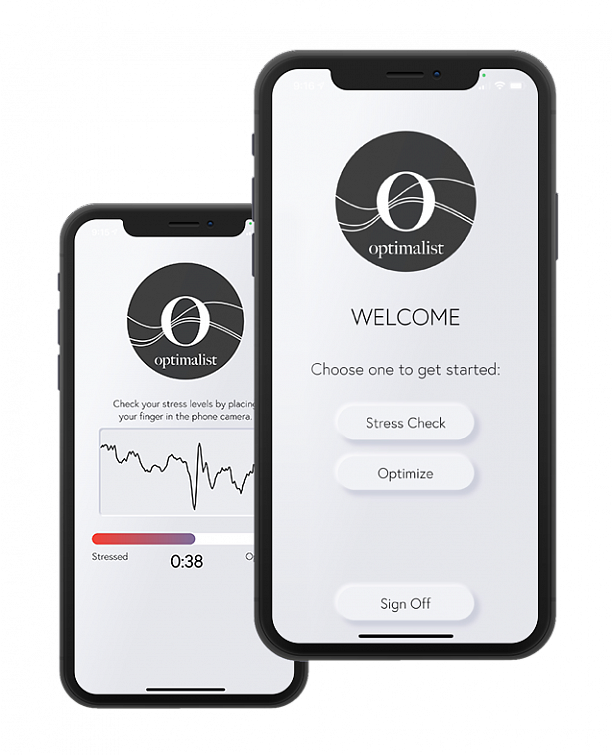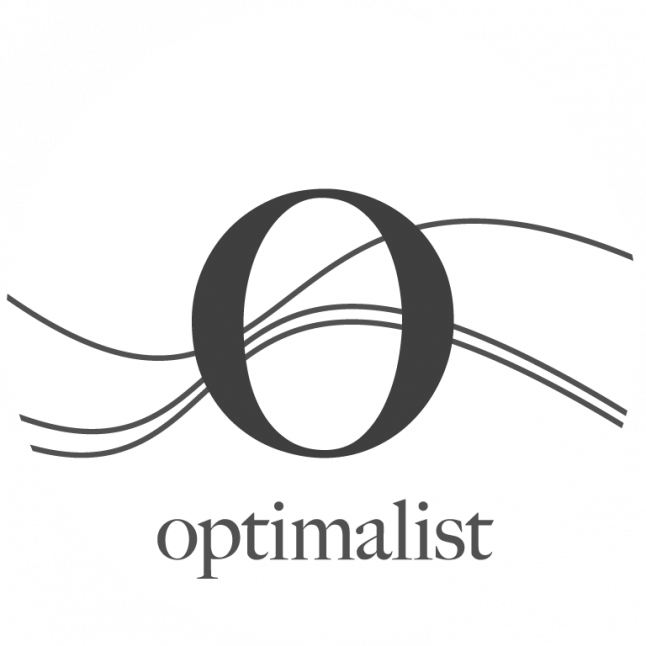52081
Optimalist
HRV biofeedback stress check and optimizing app
USA, New York
Market: Medicine, Other, Mobile applications
Stage of the project: Prototype or product is ready
Date of last change: 23.04.2021
USA, New York
Market: Medicine, Other, Mobile applications
Stage of the project: Prototype or product is ready
Date of last change: 23.04.2021
Idea
App that uses phone camera as a heart rate variability sensor, to measure stress, and to train the body to reduce anxiety and perform at its best. It also provides objective feedback that correlates activities and emotional states, and offers suggestions to optimize mental wellbeing.
Current Status
Testing beta with Testflight. V1 to be uploaded to the Apple store within a month. Talking with potential partners about white labeling opportunities.
Market
Our initial market is 30-44 yo, employed, Americans, who suffer anxiety and want to improve productivity at work, and their overall health. Our focus is on people that are looking for alternatives to meditation, and that are already using technology to better their health (eg. already using health or fitness apps). Our customers are interested in data, and how it can enhance their wellbeing. Our clients are looking for ways to potentiate benefits of already used coping tools or therapy, to be empowered, and regain more control over their lives.
Problem or Opportunity
40 mm adults suffer anxiety in the US, and 72% of Americans report workplace stress that impacts their personal life.
Stress leads to less emotional control and low energy, that also affects work efficacy and productivity. These cause a negative impact on the quality of life, and may also result in severe illnesses and a decline in mental and general health.
Many of the mental health solutions to reduce stress currently in the market are subjective and abstract, with client's progress hard to see. This leads to struggles to adhere or continue positive habits that affect mental wellbeing.
Stress leads to less emotional control and low energy, that also affects work efficacy and productivity. These cause a negative impact on the quality of life, and may also result in severe illnesses and a decline in mental and general health.
Many of the mental health solutions to reduce stress currently in the market are subjective and abstract, with client's progress hard to see. This leads to struggles to adhere or continue positive habits that affect mental wellbeing.
Solution (product or service)
We decided to build an app that provides users with feedback, in real time, of their stress levels. It uses the phone camera to measure heart rate variability, an evidenced-based method to assess the autonomic nervous system's regulation of stress. In "Optimize" mode, the user can see how daily activities affect them in a positive or negative way. If an activity is causing stress, we offer suggestions to optimize it. For example, if social media is generating anxiety, instead of suggesting to turn it off, we offer positive cognitive cues or breathing exercises to turn the experience into a more positive one.
Competitors
The combination of using the phone camera as a sensor to improve mental wellbeing, is a market not yet saturated. There is an app in the market called Breathesync, that provides biofeedback and breathing exercises, but does not correlate activities to mental states.
Other alternatives in the market are:
- Biofeedback private practitioners/CBT therapists (They provide real time feedback onto client's HRV and correlation to stress, but confined to their private practice)
Mental well being apps: Calm/Headspace (Provide stress reduction/calming tools, but without objective biofeedback of progress )
Breathing apps: Breathwrk/Breethe (Provide breathing and relaxation techniques, but without objective biofeedback of progress )
HRV biofeedback sensors: Inner balance/Apple Watch (Limited to use with external sensors. It provides biofeedback but does not correlate activities to mental states.)
Other alternatives in the market are:
- Biofeedback private practitioners/CBT therapists (They provide real time feedback onto client's HRV and correlation to stress, but confined to their private practice)
Mental well being apps: Calm/Headspace (Provide stress reduction/calming tools, but without objective biofeedback of progress )
Breathing apps: Breathwrk/Breethe (Provide breathing and relaxation techniques, but without objective biofeedback of progress )
HRV biofeedback sensors: Inner balance/Apple Watch (Limited to use with external sensors. It provides biofeedback but does not correlate activities to mental states.)
Advantages or differentiators
Advantages:
- Our intellectual property and time to market.
- Our team.
- Our innovative solution for a hot market.
Our differentiators:
- Offering a simple, evidenced based and data driven tool to improve mental wellbeing. (Many apps are complicated to use and understand, and only 30% of the "mental health" apps in the market are evidenced based.)
- The use of a phone camera as a sensor. (Although there are apps in the market with this technology, it is yet not well known or saturated in the market.)
- Provide an alternative to meditation and mindfulness (which not everyone practices, or finds effective).
- Our focus is in optimizing mental state and wellbeing, and enhancing productivity and performance, over calming or relaxing it (different from the main intention of meditation and mindfulness apps).
- Our intellectual property and time to market.
- Our team.
- Our innovative solution for a hot market.
Our differentiators:
- Offering a simple, evidenced based and data driven tool to improve mental wellbeing. (Many apps are complicated to use and understand, and only 30% of the "mental health" apps in the market are evidenced based.)
- The use of a phone camera as a sensor. (Although there are apps in the market with this technology, it is yet not well known or saturated in the market.)
- Provide an alternative to meditation and mindfulness (which not everyone practices, or finds effective).
- Our focus is in optimizing mental state and wellbeing, and enhancing productivity and performance, over calming or relaxing it (different from the main intention of meditation and mindfulness apps).
Finance
App (B2C)
Freemium Model (basic features for a week)
Premium Model
$8.99 per month (billed monthly)
$49.99 (billed annually)
Stress white label API (B2B)
Cost of API + % of revenue share
Our sales expectations is to have 120k paid subscribers in 5 years, and to achieve a revenue of $13M
Freemium Model (basic features for a week)
Premium Model
$8.99 per month (billed monthly)
$49.99 (billed annually)
Stress white label API (B2B)
Cost of API + % of revenue share
Our sales expectations is to have 120k paid subscribers in 5 years, and to achieve a revenue of $13M
Business model
Value proposition:
- Simple, novel, quantitative way of understanding and improving mental well being.
- Increases productivity, focus, and interpersonal relationships (e.g. team work)
Partners:
- Strong co-founding team with different areas of expertise (medicine, psychology, marketing, sales, software development).
Key resources:
- Intellectual property to be patented
- Strong network to help with marketing/sales initiatives
- Years of expertise developing, and scaling startups and new businesses
Customer segment
- Population that intersects: age group that suffers the most anxiety; reports greater workplace stress; and that is accustomed to spending money in technology as a way of enhancing wellbeing.
- Companies that would benefit fr om a turnkey quantifiable way of measuring stress/mental health (eg. mental health, sleep, CBD apps)
Key activities:
- Online marketing campaigns (social networks, online advertising, etc).
- Niche publications (e.g. Forbes’ mental health and innovation column)
- Wellbeing events (e.g. mental health and work productivity workshops, and conferences)
Customer relationship:
- Personal support
- Automated service
- Community
Sale channels:
- iOS (now) and Android (second phase) sales
- Social networks, websites and email campaigns
Cost structure:
- Lean expenditure (mainly WFH for foreseeable future)
- Main development cost already accounted for, so expecting it to be lower moving forward.
- Marketing/sales is wh ere we will focus a good amount of our budget
- Simple, novel, quantitative way of understanding and improving mental well being.
- Increases productivity, focus, and interpersonal relationships (e.g. team work)
Partners:
- Strong co-founding team with different areas of expertise (medicine, psychology, marketing, sales, software development).
Key resources:
- Intellectual property to be patented
- Strong network to help with marketing/sales initiatives
- Years of expertise developing, and scaling startups and new businesses
Customer segment
- Population that intersects: age group that suffers the most anxiety; reports greater workplace stress; and that is accustomed to spending money in technology as a way of enhancing wellbeing.
- Companies that would benefit fr om a turnkey quantifiable way of measuring stress/mental health (eg. mental health, sleep, CBD apps)
Key activities:
- Online marketing campaigns (social networks, online advertising, etc).
- Niche publications (e.g. Forbes’ mental health and innovation column)
- Wellbeing events (e.g. mental health and work productivity workshops, and conferences)
Customer relationship:
- Personal support
- Automated service
- Community
Sale channels:
- iOS (now) and Android (second phase) sales
- Social networks, websites and email campaigns
Cost structure:
- Lean expenditure (mainly WFH for foreseeable future)
- Main development cost already accounted for, so expecting it to be lower moving forward.
- Marketing/sales is wh ere we will focus a good amount of our budget
Money will be spent on
App development/Integration of sensors $20000
Team development $60000
Marketing / Sales $10000
General/Administrative cost $50000
Team development $60000
Marketing / Sales $10000
General/Administrative cost $50000
Team or Management
Risks
- Many mental health apps in offer, around 20,000. (Although demand is still spiking.)
- Biofeedback technology focused on mental health is not new. (But usually involves external sensors and desktop softwares, over mobile apps)
- Apps are already in the market reading HRV biofeedback, some even using phone camera as a sensor. (Many only correlate physical health with well being, or provide limited information on how mental health is affected, and what to do to improve it.)
- Other apps may appear in the market with similar functionality (Our time to market is important)
- Biofeedback technology focused on mental health is not new. (But usually involves external sensors and desktop softwares, over mobile apps)
- Apps are already in the market reading HRV biofeedback, some even using phone camera as a sensor. (Many only correlate physical health with well being, or provide limited information on how mental health is affected, and what to do to improve it.)
- Other apps may appear in the market with similar functionality (Our time to market is important)
Photos

Presentation
Sign in/Sign up
